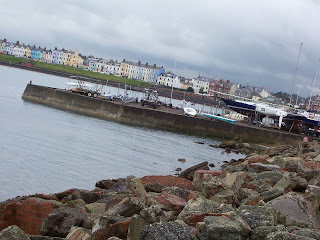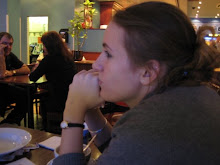 There are over a hundred libraries in Oxford. Most belong to the individual colleges, and can only be used by members (for example, we can use the Wycliffe Hall library, but not the Trinity College library). Others are more widely accessible, such as the faculty libraries (there is one for every subject). You have to be a university member, and you have to register with each library individually (I'm registered with the English, Classics, History, and Theology faculty libraries) but they allow you to check books out, which is hugely helpful.
There are over a hundred libraries in Oxford. Most belong to the individual colleges, and can only be used by members (for example, we can use the Wycliffe Hall library, but not the Trinity College library). Others are more widely accessible, such as the faculty libraries (there is one for every subject). You have to be a university member, and you have to register with each library individually (I'm registered with the English, Classics, History, and Theology faculty libraries) but they allow you to check books out, which is hugely helpful.And then there is the Bodleian. The Bodleian is the only actual "university" library, and it is HUGE. Several of its main buildings are clustered in the general vicinity of the Radcliffe square (the Old Bodleian, the New Bodleian, the Radcliffe Camera, etc.), and they are constantly building on.
This library, while gorgeous and amazing (you feel like you've stepped into history when you walk through the doors) is hugely complex. There are books located in each individual portion of the library, called "reading rooms." These cannot be reserved, and must simply be found on the many shelves of glorious knowledge. The vast majority of books in the Bodleian's collection, however, are found in "the stacks." The stacks are a mysterious entity, location unknown, where literally thousands of books wait to be requested. To get a book moved from the stacks to somewhere you can actually access it, you look it up on their database, and have it requested to a specific reading room. Within a specified amount of time, your book will arrive, and you go to that room to pick it up and read it there (my reading room of choice is the lower rr of the Old Bodleian). The Bodleian does not allow books to be taken from the premises, or moved from room to room.
This, though it sounds easy enough, was really difficult to get used to. Not the system per se, but the inability to check books out. The necessity of always reading in the library. Getting your books at the beginning of the day, claiming a table (by an ancient window, overlooking the towers and spires of Oxford), having to leave your books behind every time you needed a coffee break or food (there is a coffee shop in Blackwells, a really famous bookstore across the street), and then handing them back at the end of the day (you can have them held for you, or returned to the stacks). It was especially tricky during the British Landscapes course, because the library was still on holiday hours, and closed down at 7:00pm, and wasn't open during the weekend. However, it has definitely driven home the importance of taking good reading notes. =)
One really cool thing about the Bodleian is that it was England's first copyright library. This basically means they get a copy (or can if they want) of every book published in England since 1610. This, needless to say, has made the Bodleian a world famous research library (and is the reason it's constantly outgrowing its space allotment). The library was named after Sir Thomas Bodley (1545-1613), who secured its copyright status (and left his fortune to it) after he refurbished, and reopened, the Oxford Duke Humfrey's library in 1602. The Duke Humfrey still exists within the confines of the Old Bod., and is where the forbidden section of the Hogwart's library was filmed for the Harry Potter films. If you want to see some amazing pictures, I highly recommend you search Google images for "bodleian library."
A little archaic, but I think the following poem is cool just for the realization that every book written by every English scholar, poet, or novelist will stand tribute to this creator of libraries. What a legacy!:
Most noble Bodley! we are bound to thee
For no small part of our eternity.
Th' hast made us all thine Heirs: whatever we
Hereafter write, 'tis thy Posterity.
This is thy Monument! here thou shalt stand
Till the times fall in their last grain of Sand.
And whereso'er thy silent reliques keep,
This tomb will never let thine honour sleep.
Still we shall think upon thee; all our fame
Meets here to speak one Letter of they name.
Thou canst not dye! Here thou art more than safe
When every Book is they large Epitaph.
-Henry Vaughan (1622-1695)

















